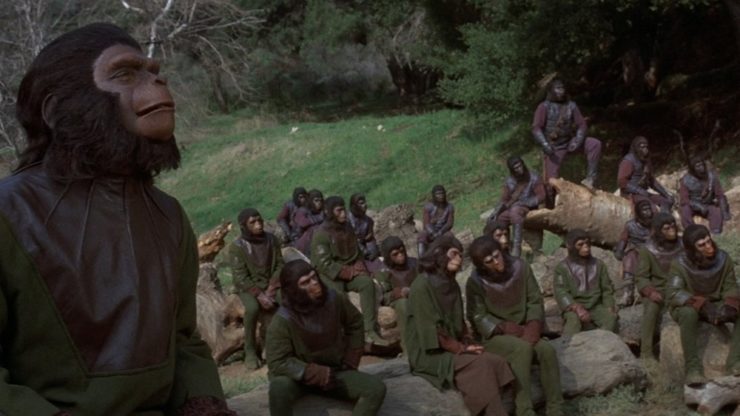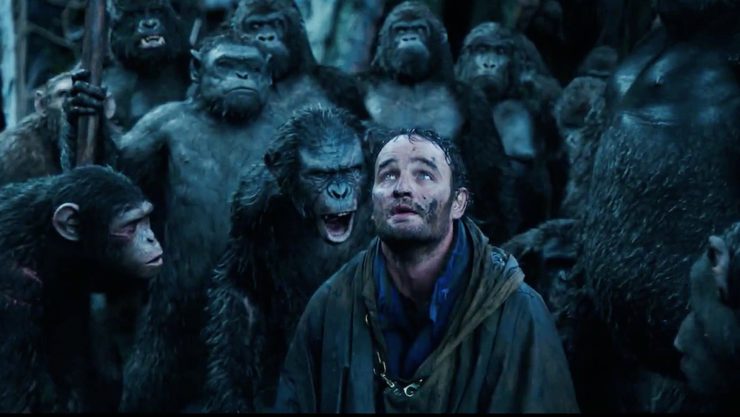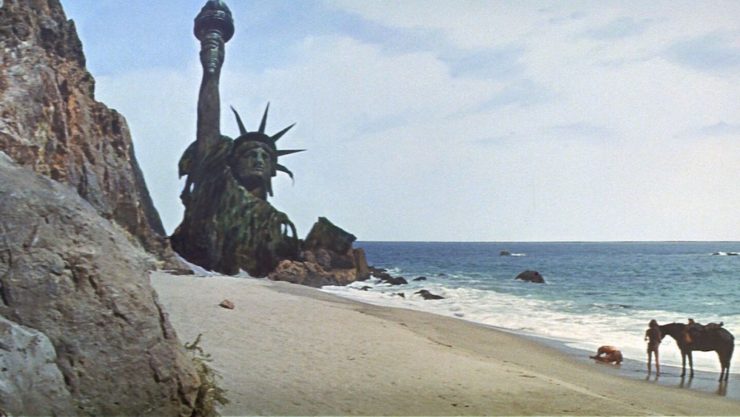In my house, we recognize eight Planet of the Apes movies: the original franchise, and the Serkis trilogy. If you’ve seen all five of the originals, you know I’m already being ethereally gracious. If you haven’t. Buckle up, buttercup.
To begin, no one writes a comparative analysis of PotA movies unless they adore them, but this adoration is most easily understood in the context of the world’s ugliest dog. Someone owns that dog, and all those hideous runners-up. Those someones adore those unfortunate looking creatures—probably because of their ugliness, as much as for any of their other attributes. That is how I love the original set of films. I love Planet of the Apes (1968), Beneath the Planet of the Apes (1970), Escape from the Planet of the Apes (1971), Conquest of the Planet of the Apes (1972), and Battle for the Planet of the Apes (1973), not because they’re good, but because someone has to. I love them so much, in fact, that every couple of years I re-watch the series and rank them anew.
No need to plead; I’ll share my current ranking now.
1. Escape: Despite being the third film in the franchise, this one is my favorite for being a self-contained story without a bunch of nonsensical and abandoned thought experiments.
2. Planet of the Apes: Although it’s iconic, the first film could never be my favorite because Charlton Heston makes for an impossibly unsympathetic main character who’s supposed to be so disillusioned with his own era of humankind that he willingly blasts off for deep space, only to heckle and belittle his fellow astronauts before turning his ire and self-righteous indignation on the ape civilization he finds in what we eventually realize is the future.
3. TIE: Conquest and Battle trade places pretty regularly, and Conquest really only makes this slot because if you take the script alone, and not necessarily the execution, it’s pretty dope. Battle is the new future forged by Caesar, wherein we realize that there are bad guys on both sides. Both sides, guise.
4. Beneath: The incontrovertible bottom of the barrel, despite that I like the second wave astronaut who followed Heston through the wormhole and, luckily, finds himself in exactly the same place and time.
These movies truly had everything: a heavy-handed, spirit of the ’60s soapbox that culminates in an overlong worship sequence involving subterranean, radiated, telepathic humans and an atom bomb (Beneath); a time travel paradox better left unscrutinized (also Beneath); a misanthropic white guy well into his golden years who instructs a teen ape not to trust anyone over 30, and then takes it upon himself to end the world (you guessed it: Beneath). Not to mention the underwhelming worldbuilding—never am I convinced that there’s an entire Planet of anything. Single, Rudimentary Colony of the Apes? Sure. Conquest of the Outdoor Terrace of a Los Angeles Mall of the Apes? Undoubtedly. The films are, in short, a triumph, and I have watched them all before each release in the Serkis trilogy.
There is not time enough to give Andy Serkis his due, so I won’t attempt it, though I will credit him with things indisputably outside his creative purview. I feel wholly justified crediting the recent trilogy to him, given that it could not have existed as it does without his involvement and expertise. Rise of the Planet of the Apes (2011), Dawn of the Planet of the Apes (2014), and War for the Planet of the Apes (2017), succeeded where the original films failed (to make sense, that is) not only because of technological advances that the first productions could hardly have foreseen, but because of the ways it deviated from the original storyline. It’s remarkable, then, that a critical moment in Dawn parallels its predecessor almost exactly.

A major stabilizing factor in what I refuse to stop calling the Serkis trilogy is that Caesar, the ape who leads his people to revolution in both series, becomes the primary character relatively early on in the first movie, and remains the emotional and moral compass throughout. In the first five, there was quite a bit of head-hopping. The first two movies primarily follow two different human astronauts before the third centers Cornelius and Zira, the far-future ape couple who’d appeared sympathetic in the preceding films. In Escape, Cornelius and Zira, well, escape the end of the world by taking the second astronaut’s shuttle back through the wormhole and landing in present-day (1970s) Los Angeles, where they eventually bear their offspring. From there, their son, Caesar (played by Roddy MacDowell, who, fun fact, had previously been playing Cornelius), leads the final two movies. While in the end, the audience is supposed to identify with both sides in what is clearly an attempt at a racial harmony allegory not overtly stated until the fourth film, the inconsistency just feels messy. There are too many self-righteous soliloquies against the backdrop of fire and revolution, not to mention a cataclysmic, world-ending event which, yes, has been effectively undone by the last three films, to suddenly resolve at an ape-human love-in.
In Conquest (1972), we meet a character named MacDonald. It’s the “future” now—the ’90s—and Caesar is coming of age in a world wherein apes have gone from replacing domestic pets after a virus wiped out cats and dogs, to replacing domestic servants. Despite that Caesar is the only ape capable of speech, and only because he is actually a far-future ape, he somehow rallies all of his kind to revolt against their human oppressors, in the first bloody scourge of revolution. As previously stated, there are some gems of dialogue in this film, particularly between Caesar and MacDonald. For instance, in the midst of the fight, Caesar speaks:
“Where there is fire, there is smoke. And, in that smoke, from this day forward, my people will crouch and conspire and plot and plan for the inevitable day of man’s downfall. The day when he finally and self-destructively turns his weapons against his own kind. The day of the writing in the sky, when your cities lie buried under radioactive rubble. When the sea is a dead sea and the land is a wasteland out of which I will lead my people from their captivity. And we shall build our own cities in which there will be no place for humans, except to serve our ends. And we shall found our own armies, our own religion, our own dynasty! And that day is upon you… now!”
Chills.
Absurdly, in that same scene there is the moment when MacDonald basically appeals to Caesar to end the bloodshed by speaking “as the descendant of slaves.” While Caesar has rightly asserted that he has the slave’s right to overthrow his oppressors, MacDonald—speaking as a human, Black man in the 1990s, in Los Angeles, the site of the Watts Rebellion of 1966—tells him to stop. MacDonald becomes the model minority, the noble if not magical negro, and the protector of the oppressor in one moment, yet funnily enough, this isn’t what makes him the weak link.
See, in the original films, due to that whole time travel dealie and the fact that Cornelius and Zira spoke of it on the record, humans in command are aware of a possible future in which apes are supposed to overthrow and then subjugate them. So when MacDonald sympathizes with Caesar, freeing him and basically making possible the revolution, he knows that he is doing it to the detriment of his species. There is no explanation given for this but his enslaved ancestry, and it is therefore a nonsensical decision that goes directly against his self-interest. But without it, the story can’t proceed. Caesar is already in custody, already identified, and is set to be executed, when MacDonald intervenes. Because there is given no other characterization of MacDonald and no indication that he himself is in peril—this is after all a parallel future in which simultaneously there are remarkably few people of color, and also one assumes an expectation of racial harmony despite the lack of explanation—it appears that MacDonald’s decision is rooted solely in identifying with an enslaved ape. Which is all kinds of problematic, and generally unsatisfying as the motivation for such a critical moment in the saga. It is also somehow quite emotionally satisfying, because despite that the story has only just now shifted to Caesar and his revolution, it is an extremely familiar narrative, borrowing unsubtly from the aforementioned Watts Rebellion, and related imagery. And so, because MacDonald betrays his species, Caesar lives to lead his Battle in the fifth and final film.
In Dawn (2014), the viewer’s allegiance has always been with Caesar, and in some ways, it means that when Malcolm, the human character, similarly saves Caesar’s life, it seems the right choice. To break through the emotional haze, I only needed six years of distance from the initial viewing.
Malcolm is part of the human remnant after the simian flu ravages the planet. He’s lost his wife, and all of society but what persists in the guts of a San Francisco shopping mall. (As in my youth, anything that’s going to happen in the world of PotA happens at the mall, friends.) What he has left is a pretty major role in the civilization trying to cleave a place in the remaining world, a son he will do anything to protect, and a new chance at love with another survivor. When he comes into contact with Caesar, it’s because his people need electricity and he will do anything to keep them in the light. Which, when you think of it from that perspective, from Malcolm’s actual perspective, versus Caesar’s, makes what he does in the end completely unacceptable.

Unlike in Conquest, the humans have no pre-knowledge of the world to come. They’re not already on the look-out for ape overseers—but they have been put into camps by apes, however temporarily. They have been defeated in a pretty spectacular battle by apes. And despite that the flu that wiped out the rest of humankind showed them to be immune, that new lease of love Malcolm’s enjoying is with a doctor with the Center for Disease Control. I feel like she would know that just because they were immune to the lethal strain doesn’t mean that prolonged exposure to the apes couldn’t result in some other harmful adaptation. Which…does happen in the next film. So what exactly is Malcolm’s reason for what he does? He’s saved Caesar’s life before, but due to the murderous rampage of another ape, Caesar is pretty much his people’s only hope. That’s not the part I’m talking about. I mean when all of the apes are up on the tower, and all of Malcolm’s fellow humans in command are setting up explosives to wipe them out. Why does Malcolm not just decide to give Caesar time to battle it out and come down victorious—which he has no reason to believe will happen, seeing as Caesar’s just come out of major surgery—but also pull a gun on his fellow humans? The same humans he was striving for throughout the entire movie. It almost feels like the writers forgot that Malcolm isn’t a human watching the movie and identifying with Caesar by design, but that Malcolm inhabits the world of Caesar, wherein his objective is supposed to be the survival of his kind. Characters who have never been villainous are quickly demoted to antagonist by arguing that Caesar is an animal—which, of course, he is. So when Malcolm literally threatens their lives to keep Caesar from harm, and the bomb blows, we aren’t supposed to care about the multiple human lives lost, because Malcolm’s decision is in service of our protagonist.
That doesn’t mean it makes sense.
If Malcolm hadn’t made his completely out-of-character decision, the story would’ve ended there—which would’ve been a real shame because War is a masterpiece. It isn’t as unacceptable as MacDonald’s decision, because Malcolm doesn’t have the benefit of foresight, but it’s still a human character similarly weakening the narrative, and at similarly critical points in the plot. In neither case is there another solution for the imperiled Caesar; his life depends on the respective human ally betraying his species in an irreconcilably illogical way. The difference, of course, being that the Andy Serkis trilogy is otherwise fantastic.
If I’m being honest, in neither case did I immediately reject these narratives. Which, I’m sure, tells you something about me, but probably moreso about the power of using familiar motifs. Who among us hasn’t been emotionally manipulated by a story, only to realize literal years later that it was indefensibly weak writing, and that we were all complicit? And who, at that point, didn’t purchase the Legacy Collection, including all five of the original films and a documentary plus other supplemental material?
I know I did.
Originally published February 2020.
Buy the Book


A Song Below Water
Bethany is a recovering expat splitting her time between Montreal, Quebec, and upstate New York—yet another foreign place. A California native, Bethany graduated from the University of California, Santa Cruz with a BA in Sociology (but took notable detours in the Film and Theatre departments). Following undergrad, she studied Clinical Psychological Research at the University of Wales, Bangor, in Great Britain before returning to North America to focus on her literary work. Her YA novel A Song Below Water publishes in June 2020 with Tor Teen.










